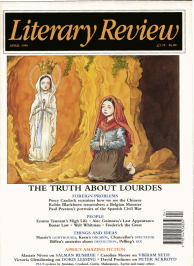Richard Gray
Barbaric Yawp
Walt Whitman: The Song of Himself
By Jerome Loving
University of California Press 545pp £24.95
‘He is America,’ Ezra Pound observed of Walt Whitman. ‘His crudity is an exceeding great stench, but it is America.’ Never frightened of being called crude, Whitman would have appreciated the comment; and, as Jerome Loving shows, he would have liked being identified with America because that was his aim – to speak as a representative American and turn the New World into words. Whitman certainly had this aim after the day in 1842 when he attended a lecture given by Ralph Waldo Emerson, in which Emerson prophesied the imminent arrival of an American Homer to celebrate ‘the barbarism and materialism of the times’.
‘America is a poem in our eyes,’ Emerson declaimed. ‘Its ample geography dazzles the imagination, and it will not wait long for metres.’ Whitman saw himself as the fulfilment of that prophecy – he was the man, he felt, with the courage needed to capture the ‘ample geography’ of the country, in lines as bold and wild as its landscape – and in the Preface to the first (1855) edition of his Leaves of Grass he deliberately echoed Emerson. ‘The United States themselves are essentially the greatest poem,’ he wrote, thereby alerting the reader to what he was trying to do: to invent a poetic form founded on raw experiment, and a line that swung as freely as the individual voice. Loving patiently catalogues how Whitman came to create this form and line. The influences were many, from Italian opera to the insistent repetitions of the King James Bible, but the essential factor, his book shows, was Whitman’s sense of himself: for him, poetry was a passionate gesture of identification with his native land.
This is not the first book to establish Whitman’s desire to turn ‘America … a poem’ into an American poem – many of the biographies preceding it have done the same. Where it scores is in the use of his newspaper writings and archives to establish, in addition,

Sign Up to our newsletter
Receive free articles, highlights from the archive, news, details of prizes, and much more.@Lit_Review
Follow Literary Review on Twitter
Twitter Feed
Under its longest-serving editor, Graydon Carter, Vanity Fair was that rare thing – a New York society magazine that published serious journalism.
@PeterPeteryork looks at what Carter got right.
Peter York - Deluxe Editions
Peter York: Deluxe Editions - When the Going Was Good: An Editor’s Adventures During the Last Golden Age of Magazines by Graydon Carter
literaryreview.co.uk
Henry James returned to America in 1904 with three objectives: to see his brother William, to deliver a series of lectures on Balzac, and to gather material for a pair of books about modern America.
Peter Rose follows James out west.
Peter Rose - The Restless Analyst
Peter Rose: The Restless Analyst - Henry James Comes Home: Rediscovering America in the Gilded Age by Peter Brooks...
literaryreview.co.uk
Vladimir Putin served his apprenticeship in the KGB toward the end of the Cold War, a period during which Western societies were infiltrated by so-called 'illegals'.
Piers Brendon examines how the culture of Soviet spycraft shaped his thinking.
Piers Brendon - Tinker, Tailor, Sleeper, Troll
Piers Brendon: Tinker, Tailor, Sleeper, Troll - The Illegals: Russia’s Most Audacious Spies and the Plot to Infiltrate the West by Shaun Walker
literaryreview.co.uk